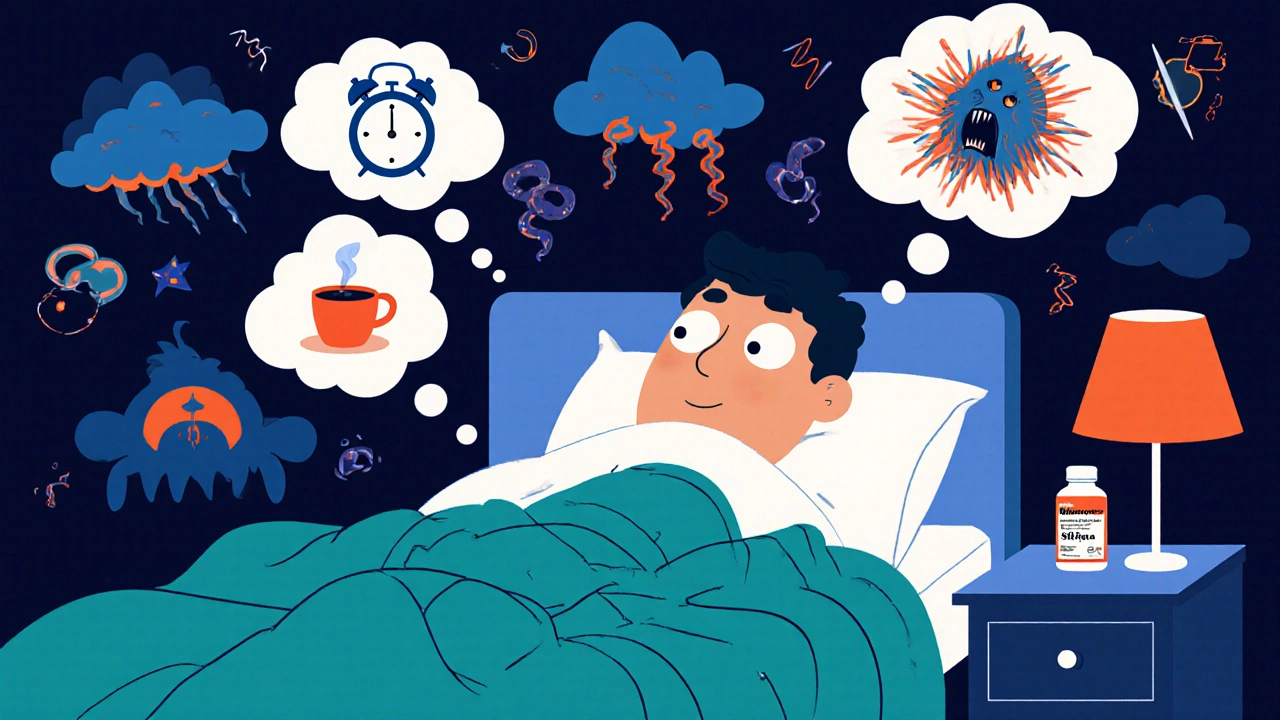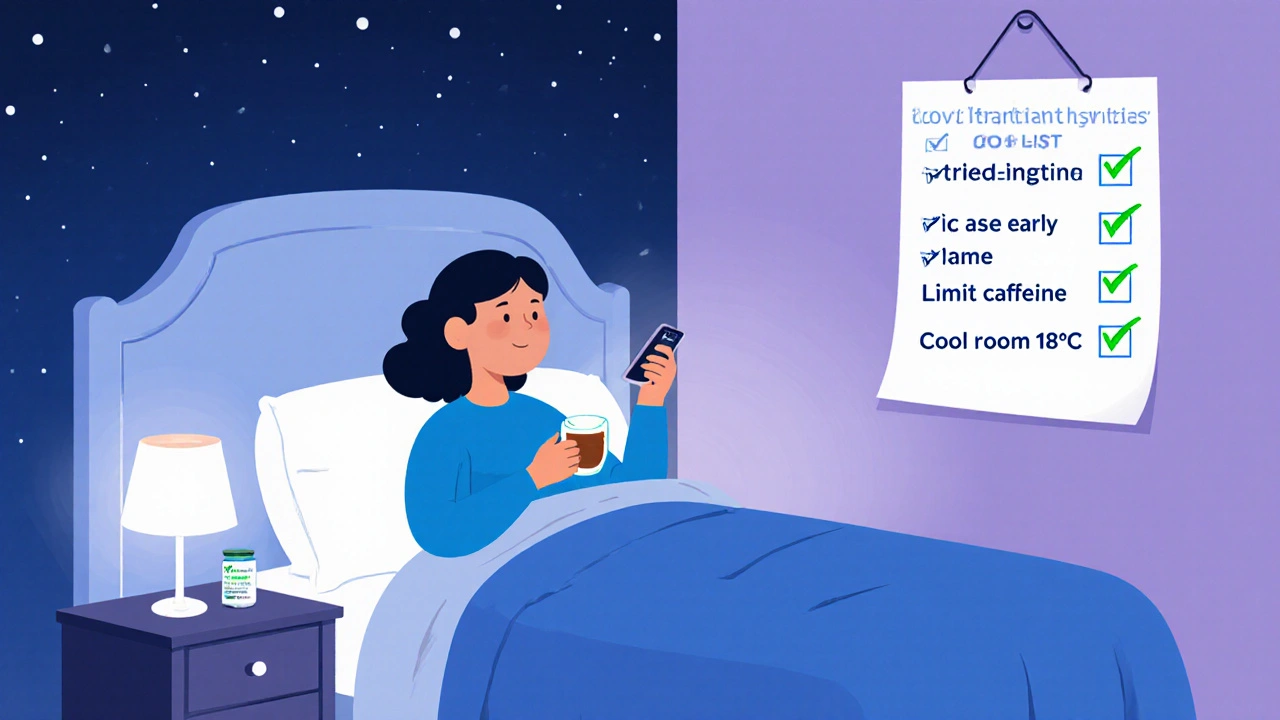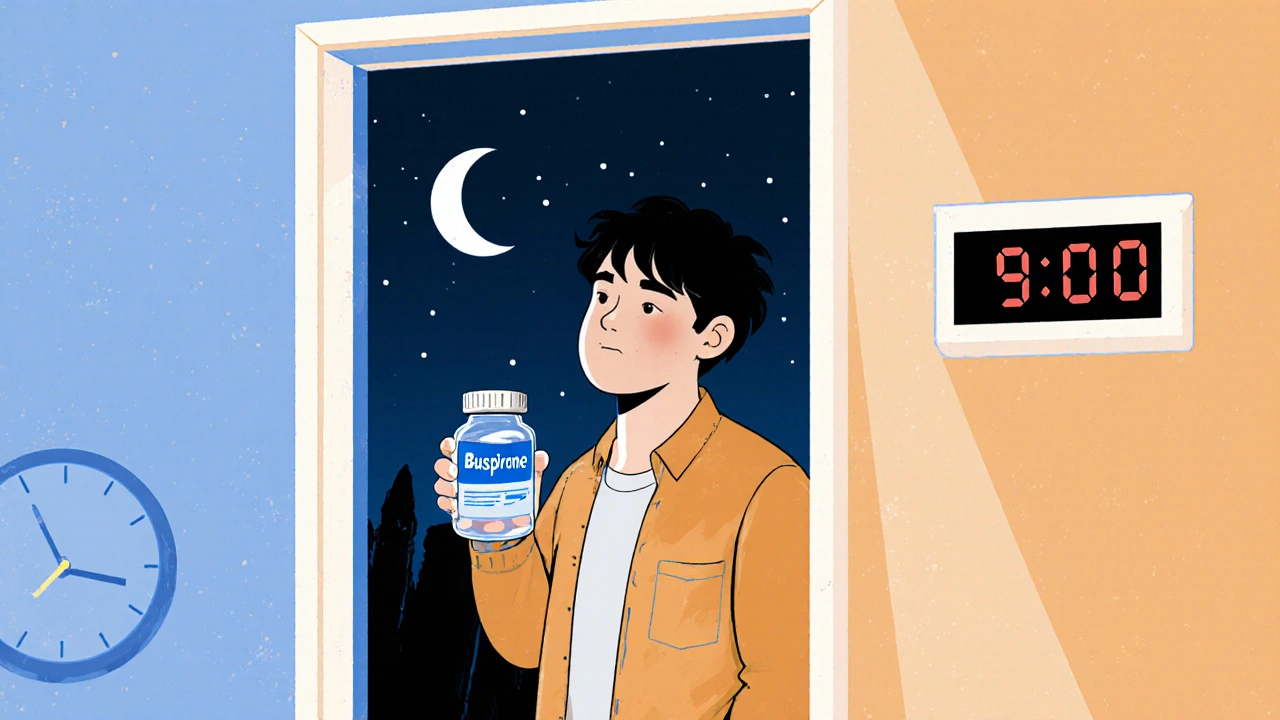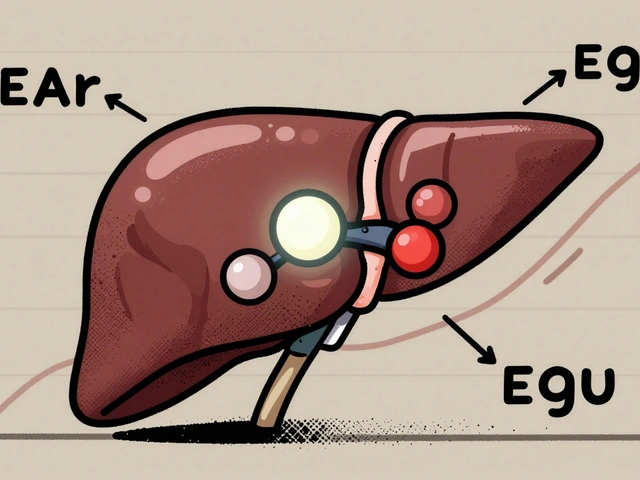Buspirone and Sleep: Effects, Tips & Managing Insomnia
Buspirone Sleep Timing Calculator
Optimal Buspirone Timing Calculator
Calculate the ideal time to take your last dose of buspirone to minimize sleep disruption based on its pharmacokinetics.
Timing Results
How to Use This Tool
Enter your bedtime and the time you plan to take your last dose of buspirone. The calculator will show if your timing is optimal based on the drug's pharmacokinetics.
Many people who take buspirone sleep wonder whether the drug will help them unwind at night or keep them tossing and turning. The short answer is: it depends on dosage, timing, metabolism, and what else you’re doing to promote rest. In this guide we’ll break down exactly how buspirone interacts with sleep patterns, what side‑effects to watch for, and practical steps you can take to protect your night‑time recovery.
Key Takeaways
- Buspirone is an anxiolytic that rarely causes deep sedation, but it can trigger mild insomnia in some users.
- Half‑life (≈5hours) and peak plasma time (≈1‑2hours) make timing crucial for sleep.
- Drug interactions (especially with CYP3A4 inhibitors) can amplify sleep‑disturbing effects.
- Non‑pharmacologic sleep hygiene and low‑dose melatonin often offset buspirone‑related restlessness.
- Consult your prescriber if insomnia persists beyond two weeks or worsens.
How Buspirone Works
Buspirone, marketed under names like Buspirone is a serotonin 5‑HT1A partial agonist used to treat generalized anxiety disorder (GAD), does not belong to the benzodiazepine class. Instead of sedating the brain, it modulates serotonin pathways, reducing the "fight‑or‑flight" response without causing marked drowsiness.
Key pharmacokinetic facts:
- Usual dose: 5‑30mg per day, split into two or three administrations.
- Peak plasma concentration: 1‑2hours after oral intake.
- Elimination half‑life: ~5hours (varies with age, liver function, and CYP3A4 activity).
Because the drug reaches its highest level relatively quickly, taking the last dose too close to bedtime can raise the chance of sleep‑onset insomnia.
Common Sleep‑Related Side Effects
Clinical trials report insomnia in roughly 5‑10% of patients, while other sleep‑disturbing symptoms appear less frequently.
| Side Effect | Incidence | Typical Onset |
|---|---|---|
| Insomnia (difficulty falling asleep) | 5‑10% | Within first 1‑2weeks |
| Nighttime restlessness | 3‑6% | 2‑4weeks |
| Vivid dreams or nightmares | 1‑3% | After dose escalation |
Most of these effects are mild and resolve as the body adjusts, but they can be aggravated by caffeine, irregular sleep schedules, or other stimulants.

Factors That Influence How Buspirone Affects Your Rest
- Timing of the last dose - Taking the final dose after 6p.m. often pushes the peak concentration into typical sleep hours.
- Individual metabolism - The liver enzyme CYP3A4 metabolizes buspirone. Genetic variations or concurrent CYP3A4 inhibitors (e.g., erythromycin, grapefruit juice) prolong drug exposure.
- Concurrent medications - Sedative hypnotics like zolpidem may counteract buspirone‑related wakefulness, but combining them can increase daytime drowsiness.
- Underlying anxiety level - If anxiety spikes at night, the anxiolytic effect may actually improve sleep, offsetting mild insomnia.
- Lifestyle habits - Evening exercise, screen exposure, and heavy meals all compound the drug’s impact.
Managing Sleep While on Buspirone
Below are practical steps that have helped patients keep their nights calm:
- Schedule the last dose early: Aim for at least 8‑10hours before bedtime.
- Consider a low‑dose melatonin supplement (0.5‑3mg) taken 30minutes before bed to reinforce the circadian signal.
- Limit caffeine after noon and replace evening drinks with herbal teas such as chamomile.
- Adopt sleep‑hygiene rituals: dim lights, cool room (≈18°C), and a consistent wind‑down routine.
- Use Cognitive Behavioral Therapy for Insomnia (CBT‑I) - Structured sessions often reduce medication‑related sleep complaints within 6‑8 weeks.
- Review other meds: If you’re on antihistamines, SSRIs, or stimulants, discuss timing adjustments with your prescriber.

Alternatives & Complementary Strategies
If insomnia remains a problem despite the tricks above, you might explore other anxiolytics that have a more sedating profile. Below is a quick look at common options.
| Medication | Primary Action | Typical Sleep Effect | Notes |
|---|---|---|---|
| Buspirone | 5‑HT1A partial agonist | Neutral‑to‑insomnia | Low dependence risk |
| Escitalopram (SSRI) | Serotonin reuptake inhibition | Initial insomnia, later neutral | May cause sexual side‑effects |
| Hydroxyzine | First‑generation antihistamine | Promotes sedation | Short‑term use only |
| Alprazolam (benzodiazepine) | GABA‑A modulation | Strong sedation, risk of dependence | Generally avoided for long‑term anxiety |
Switching medications should never be done abruptly. A tapering plan, guided by a clinician, minimizes withdrawal and rebound anxiety.
When to Talk to Your Doctor
While occasional sleep‑onset trouble can be managed at home, you should seek professional advice if you notice any of the following:
- Insomnia persisting beyond two weeks after dose stabilization.
- Daytime fatigue that interferes with work or safety.
- Vivid nightmares or night sweats.
- Signs of depression or suicidal thoughts.
Your clinician may lower the dose, shift the dosing schedule, or add a short‑acting hypnotic to bridge the gap while your body adjusts.
Frequently Asked Questions
Can buspirone cause daytime sleepiness?
Daytime drowsiness is uncommon. Most patients report feeling alert, especially if the last dose is taken early in the evening. If you do feel sleepy, check for drug interactions or an excessively high dose.
Is it safe to combine melatonin with buspirone?
Yes, melatonin works on a different pathway (the pineal gland) and does not increase the risk of serotonin syndrome. Start with a low dose (0.5mg) and monitor how you feel.
Should I avoid alcohol while taking buspirone?
Alcohol can amplify any sedative impact and may increase anxiety rebound once it wears off. Limiting intake is advisable, especially if you already have sleep disturbances.
How long does it take for buspirone‑related insomnia to improve?
Most people notice improvement within 2‑4weeks as the body adapts. If symptoms persist beyond a month, contact your prescriber for a possible dose adjustment.
Can buspirone be taken with a prescription sleep aid?
Short‑term use of a hypnotic like zolpidem can be combined, but only under medical supervision. The combination may increase next‑day grogginess.
By understanding how buspirone works, being mindful of timing, and supporting your night‑time routine, you can keep anxiety under control without sacrificing precious sleep.






13 Comments
Malia Rivera
October 17 2025When you think about the night as a frontier of liberty, the idea that a pill might tilt the balance between restless wakefulness and quiet surrender becomes oddly symbolic. Buspirone, unlike the heavy‑handed sedatives, respects the individual’s agency, letting the mind settle without forcing a blanket fog. In an American context we prize self‑reliance, and finding the right dosing window is an act of personal responsibility. If you push the last dose too late, you’re essentially sabotaging your own freedom to rest. So schedule it early, honor the rhythm, and you’ll sleep like a citizen who has defended his rights all day.
lisa howard
October 25 2025I remember the first night I tried to adjust the timing and it felt like a drama scene straight out of a soap opera. The clock struck seven, I took my dose, and by nine I was staring at the ceiling like a character waiting for the next cue. Every little creak in the house became a soundtrack to my growing anxiety, and the shadows on the wall turned into haunting whispers of “why won’t I sleep?” I paced, I brewed chamomile, I even tried counting sheep that wore tiny business suits. The whole episode lasted longer than a Netflix binge, and I finally learned that the night demands a gentle hand, not a frantic sprint.
Cindy Thomas
November 3 2025Sure, the guide says buspirone is neutral‑to‑insomnia, but the real world often paints a different picture – you might end up tossing more than a heavyweight boxer in a ring. I’ve seen people claim they sleep like logs, yet the underlying restlessness can be a silent thief of deep REM, so take that claim with a grain of salt 🙂. The key is to monitor your own rhythm, not just the textbook stats.
Kate Marr
November 11 2025Timing is everything – set that last dose before dusk and let the night do its work 🇺🇸. A simple schedule shift can save you from midnight battles with your own brain.
James Falcone
November 19 2025Exactly, keep the dose early and you’ll thank yourself when the alarm rings. Late night pills are a recipe for sleepless patriotism.
Frank Diaz
November 28 2025Let us contemplate the very nature of sleep as a philosophical construct, a canvas upon which the mind paints its subconscious narratives. Buspirone, a modest 5‑HT1A partial agonist, arrives at this canvas not as a blunt brush but as a nuanced hue, subtly shifting the tonal balance without overwhelming the composition. When the drug reaches its peak plasma concentration within one to two hours, it can nudge the neuronal circuits toward calm, yet it does so with a temporal precision that demands respect. If the final dose is administered too close to the intended hour of darkness, the lingering pharmacologic echo may intersect with the natural circadian lull, producing a discordant chord of insomnia. This intersection is not merely a side effect; it is an invitation to examine the synchrony between external regimen and internal rhythm. The hepatic enzyme CYP3A4, with its genetic polymorphisms, acts as a gatekeeper, accelerating or decelerating the drug’s clearance, thereby altering the duration of its influence on the sleep architecture. Concurrent ingestion of CYP3A4 inhibitors – think grapefruit juice or certain antibiotics – can transform a modest evening dose into an uninvited nocturnal guest. Moreover, the anxiety that initially prompted the prescription can itself be a nocturnal adversary, persisting beyond the pharmacologic window and manifesting as racing thoughts that thwart sleep onset. In such cases, the anxiolytic’s modest sedation may be insufficient, leading the patient to experience a paradoxical increase in wakefulness. The clinical literature cites a 5‑10% incidence of insomnia, a figure that, while seemingly low, translates to a substantial number of individuals grappling with disrupted rest. Lifestyle variables – caffeine consumption after noon, exposure to blue‑light screens, and irregular meal timing – compound these pharmacodynamic dynamics, often tipping the balance toward restlessness. Conversely, employing sleep hygiene strategies such as dimming lights, maintaining a cool bedroom environment, and establishing a consistent pre‑sleep ritual can mitigate the drug’s potential to disturb. The addition of low‑dose melatonin, operating via the pineal pathway, may reinforce the circadian signal without interacting adversely with serotonergic mechanisms. Should insomnia persist beyond two weeks, it is prudent to re‑evaluate the dosing schedule, perhaps shifting the final tablet to earlier in the evening to allow the drug’s peak to subside before bedtime. In sum, the relationship between buspirone and sleep is a delicate dance of timing, metabolism, and personal habits, each step requiring mindful choreography to preserve the restorative essence of night.
Mary Davies
December 6 2025The night feels like a stage where every thought takes a spotlight, and buspirone can be the backstage crew that either dims the lights or leaves them glaring. If you catch the timing right, anxiety fades and the curtain falls gently. Miss the window, and you’re left with a spotlight on every worry. Keep the dose early, and let the drama end before the audience – your brain – is ready.
Valerie Vanderghote
December 14 2025Speaking from personal experience, I’ve walked the tightrope of late‑night dosing and felt the pendulum swing between calm and chaos. The subtle restlessness that creeps in can feel like a phantom whisper, tugging at the edges of consciousness. By moving the last tablet to before dinner, I observed a marked reduction in nightly mind‑racing. Pairing that shift with a cup of herbal tea created a soothing ritual, effectively silencing the phantom. Consistency, as always, is the unsung hero in this nightly opera.
Michael Dalrymple
December 23 2025From a supportive standpoint, consider integrating Cognitive Behavioral Therapy for Insomnia alongside your medication regimen. Structured sleep‑hygiene practices can reinforce the pharmacologic effects and promote deeper restorative cycles. Monitoring your sleep patterns through a journal will provide tangible data for your clinician to adjust dosing if needed. Remember, the goal is a harmonious balance between anxiety management and restful sleep.
Emily (Emma) Majerus
December 31 2025Take it early and you’ll sleep like a rock, no need to overthink it.
Virginia Dominguez Gonzales
January 8 2026Imagine the night as a gentle sea – when the waves of anxiety are soothed, the moonlight can dance upon the water without interruption. Let the early dose be your lighthouse, guiding you to a calm shore where dreams flow freely.
Carissa Padilha
January 17 2026Ever wonder why pharma pushes these “neutral” meds while the big corporations profit from your sleeplessness? They’re quietly tweaking the formula, adding hidden stimulants that keep you wired just enough to need more. The timing tip sounds helpful, but it’s a distraction from the real agenda – keeping you dependent. Trust your own body’s rhythm, and don’t let the industry dictate your nights.
Richard O'Callaghan
January 25 2026i think the tip is good but i also think you should watch out for interactions with other meds like anti-histamines they can make you feel dizzzy. also try to keep a regular sleep schedual and limit caffeine after 2pm.